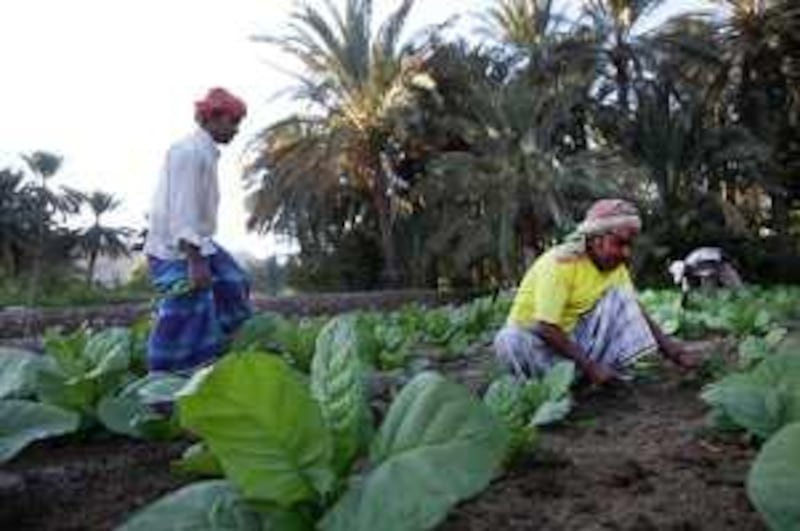HATTA // Touching the first leaves of the season, Salem al Kaabi surveys his 20-day-old tobacco crop with pride. It is work passed down to him from his father and grandfather. "This is our original place, but in these times we face a lot of problems," said Mr al Kaabi, who works on family land a few kilometres from Hatta on the Omani side of the border.
One of those problems is that his family's line of work is now illegal in the UAE. Legislation approved last week bans growing tobacco in the Emirates. Violators could face up to a year in prison and a fine of up to Dh1 million (US$272,250). Hatta and neighbouring communities near the Oman border, about 120km south-east of Dubai, have been a centre of tobacco production in the region for centuries.
Today, the tobacco farmed in this area supplies most of the country's dokha, the pure tobacco used in traditional slender pipes, known as midwakh. While farmers are likely to be given time to comply with the new law and change their choice of crops, growers are worried about their futures. "My father taught me how to grow the plants," says 23-year-old Mr al Kaabi, an Omani. "I work and earn this money by myself. With this ban, I don't know what we will do. Business is very good now but we only sell to the UAE."
His clients use the main road south from al Madam to Hatta, which cuts into Oman. Villages straddle the border and the roads around them were largely open. Now they are monitored by checkpoints. The army is not there to check people, but to control the flow of tobacco from Omani farms to UAE shops, a trade that was unregulated for years. Mr al Kaabi, who also collects honey and grows date palms, mangos and oranges, said the change was likely to disrupt his household accounts as tobacco is by far his most valuable crop.
His farm is divided into tiny subplots called yelba, which measure about two by three metres each. The tobacco is planted in December, harvested in August and dried in an open-sided shelter before it is ground and is ready to sell. Each plot produces enough dried tobacco leaf worth about Dh210. The farm has more than 3,000 yelba, and Mr al Kaabi expects to make Dh630,000 from this year's harvest. Costs for electricity, water and labour are minimal.
He estimates at least half of his tobacco is sold in bulk to merchants, while the rest is sold for personal use. In a storeroom, there are a dozen huge sacks of the ground leaf that will see the farm through until the next harvest in August. While the new law and the checkpoints were intended to curb tobacco use, Mr al Kaabi said the road blocks have not stopped business. Though he knows the ban will eventually reduce demand, he is confident that customers will keep showing up.
"So many people come," he says. "They ask people about good dokha and they know to come here." However, authorities are obligated to enforce the law and to eradicate the cultivation of tobacco. Obaid al Kaabi, 37, a police officer who is also a farmer, said he agreed with the ban in principle but that it would be difficult for the families of Hatta. "These workers will lose their work and it's also a problem for nationals. Now, thanks be to God, business is good but I have six children," he said.
He estimates there were about 30 tobacco farms around Hatta and another 30 in the Mahdah district on the Omani side of the border. "What we are selling is from before the ban", said a 27-year-old Iranian merchant who did not want to be named. "We can't get it through the roads. In a few years we might have to close our store. "But people are still smoking it, even men in police and the army. They don't care. In the Emirates boys don't want cigarettes, they want midwakh." Most midwakh merchants who buy the tobacco are from Iran and many are concerned it will be the end of their family business.
"It's all from Hatta," says a 27-year-old merchant from Shiraz who works at a midwakh store on Sheikh Zayed Road in Dubai that is part of a four-store chain. "We need to get it fresh or we'll have to go back to Iran." Midwakh has grown in popularity among teenage boys, who prefer it as a cheap alternative to cigarettes. It is also easier for underage smokers to buy and hide from their parents. Additionally, the midwakh is more culturally acceptable and, incorrectly ,considered less harmful than cigarettes.
In Ras al Khaimah and Fujairah, tobacco is still grown on isolated family farms in the mountains. Most is for personal use and the new law is unlikely to dent household incomes, local residents say. "It won't affect farmers much yet," says Qasim Ali, a farmer from Wadi al Baih in Ras al Khaimah, whose family stopped growing tobacco a few years ago. But even some local leaders feel that health concerns should override tradition. "If it makes you sick, what's the point?" said Saeed Abdulla al Hebsi, an elder of the Habus tribe in Wadi al Baih. "
@Email:azacharias@thenational.ae






